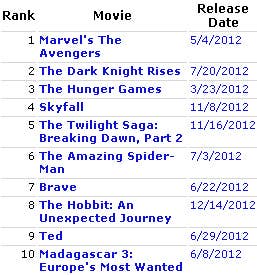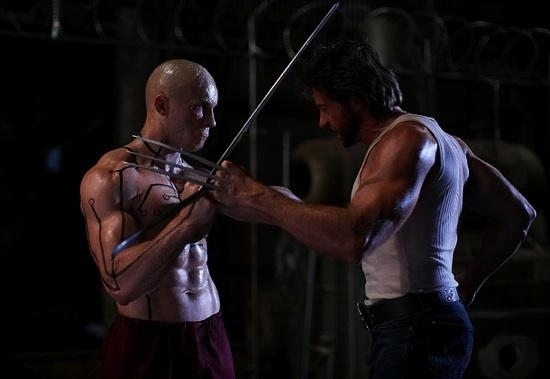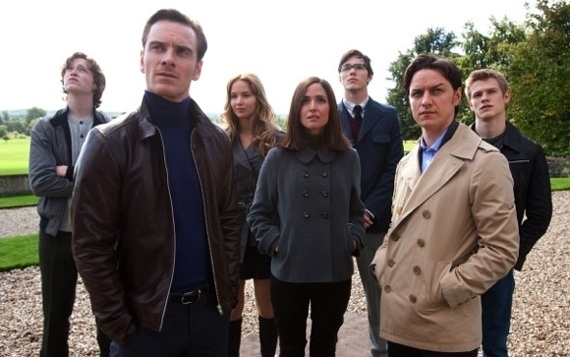*Spoilers for The Walking Dead later in this article*
We all have that book or graphic novel that holds a special place in our hearts, the one that knows exactly what emotions you're feeling and what you're going through, the one that understands you better than you understand yourself, the one we would be hesitant to see made into a film or television series, the one that would need to be adapted so perfectly in order to encapsulate the magic of the original story. Unfortunately, we live in an age of adaptions, of remakes, of sequels. Nothing's new in Hollywood anymore. Just look below at the top ten grossing movies from last year.

We have four adaptions, one sequel, and three sequels of adaptions! This leaves us with two original films out of the ten. Like it or not, everything we love will soon be a movie or TV show. It's because of this that you must learn to embrace it and allow yourself to enjoy the separate mediums without judging them against each other.
What's great in a book isn't something which will necessarily be great on film, or hell even possible on film (everyone thought Watchmen would be an impossible film to make). And what is possible on film may end up being a lot longer than a justifiable movie can be. Take the easiest example of this length issue: Harry Potter. Die-hard fans (myself included) were always upset about this and that not being included in the film, when in reality, if all of the this and that had been included, we'd be watching an incredibly boring, expository 5 hour movie. The Harry Potter books are filled with plenty of exposition and great moments for all of the supporting characters, no matter how small. And that's wonderful and perfect in the book. And the films are still wonderful and perfect regardless of their exclusion of minuscule plot lines.

Something else to consider is how stories are told within different mediums. In The Hunger Games book, Katniss has an inner monologue about what tracker-jackers are when they first appear, giving the reader plenty of information about these nasty little pests. Now, since the film adaption decided not to have Katniss narrate (a wise choice if you ask me), they instead had to come up with another way to explain to the viewers what the hell a tracker-jacker is. So, in the film, we see a few of the Games announcers discussing it "for the viewers at home." This wasn't a scene in the book, in fact the book never really spent any time with the Games announcers, but it got its point across in a perfectly entertaining and suspenseful way. This is the type of little change that will drive any source material slave crazy. In fact, my own brother was furious they had it play out that way. When you're adapting material from one medium to another, sometimes you have to be clever and this is exactly the type of inventive change that a successful adaption has.
So, that one book or graphic novel that we all hold dear; well, for me, it's the X-men. I've loved X-men comics for as long as I can remember, and I've always been fascinated by the idea of protecting those who fear and hate you. The X-men are the ultimate heroes because no one celebrates them. I enjoyed the first three X-men films (yes, even the widely panned third one was okay), but then came their first solo venture in X-men Origins: Wolverine.

Never has a movie so infuriated me as X-men Origins: Wolverine did. I said over and over again, "Why invent a new origin story when a perfectly good one already exists?" And...now that's still a tough question to answer, but admittedly it's not as black and white as I had once thought. Wolverine was a dumb character to pick for an origin story since part of his mystique is that for so long he didn't know what his origin was. What they should have done and what they're doing now with The Wolverine is tell a good Wolverine story. Not every superhero movie needs to be an origin story.
Regardless, this was the film that really solidified my tent in the source material slave camp. I wanted them to directly adapt Wolverine's origin and do nothing more. Tell the story that was already there. Unfortunately, in a lot of cases, it's not that simple. As I already mentioned, length and storytelling style are things that many times cannot be carried over into another medium. There are also plenty of other reasons to change the way you tell a story when it's a book and when it's a movie. They're two very different things and stories must be adapted to better suit the form. Movies have visual and auditory aspects and books just don't. This is why many times on screen a story needs to be told differently than you would expect (like with Katniss and the tracker-jackers). Finally a couple of years ago, a movie came along that made me understand why this is true.

X-men: First Class takes characters we know (if you're a comic reader that is), puts them together in ways that make little to no sense, creates a story that absolutely never took place in comics continuity, and yet I loved it all. This film was meant to be a sort of prequel to the other X-men films, and in an effort to keep things fresh, the filmmakers used several characters movie audiences had never seen before. We get some classic characters like Beast and Magneto but then we're given much lesser known characters (even in the comics community) like Angel Salvatore and Darwin. Lots of comics are still published today, and writers create stories and put different characters on teams together to construct something new for the readers. Why can't movies do the same? And it was with this film that I once and for all understood that it was okay for movies to do that, too.
A whole 'nother aspect to all of this is when creators actually adapt things themselves. The Walking Dead was a fairly popular comic and since becoming a television show has become a ratings juggernaut, defeating even the networks (which is no small feat as a cable drama). Robert Kirkman, who created and has written every issue of the comic, has been a writer and producer on the show since day one of its pre-production. He has been very vocal about wanting to establish it as a separate story from the comics it's based on and the show has done a good job of taking different paths to end up at the same place. There's a character named Shane who dies very quickly in the comic (in issue 6), but he sticks around for a while in the show. Kirkman said, "From the comic book standpoint, he's living on borrowed time, but the beauty of the show is that we can change things up..." (http://dailydead.com/the-walking-dead-robert-kirkman-talks-shanes-future/).
This is a beautiful idea to me, especially as a writer. Kirkman has had years to consider the story he wrote (the first issue was published ten years ago now), and he's realized that perhaps there were things he would've changed. Maybe he wants to keep this guy alive longer and kill this guy sooner. That is his prerogative as the creator and he's shown that he can tell two very similar stories (one in comic form and one on television) masterfully without making it feel like you know everything that's coming if you read the comic. As a longtime reader of The Walking Dead, I love that it's not a direct adaption, because it would be so boring if I constantly knew what was going to happen next. I love that Kirkman found a way to keep surprising even the most devoted fans of his work.
When the creator of the original material is the one with the keys to the car, you can feel much safer about the transition to a new art form. Stephen Chbosky wrote the book The Perks of Being a Wallflower, and when a studio was interested in adapting the book into a feature film, Chbosky signed on as both writer and director. While I enjoyed the film, I found it left out some parts of the book I had thought were interesting and lost all of the subtlety which I had attributed to making it a beautiful story to begin with. Since I refuse to be a slave to the source material, I forced myself to think about the film on its own, disregarding the book entirely. I realized that by itself I loved the film more than I was allowing myself to because I was hung up on comparing it to the book. Regardless of what I thought, it was nice knowing that this was truly the auteur's vision for his material.
And one more quick point to be made about The Walking Dead and adapting things for television...

...there are things you can't show on television. Maybe there's a way they could get away with this depending on the way the scene is shot, but who wants to be the show that brutally kills a newborn? This was heart wrenching when it happened in the comics, but it was unnecessary to have it take place in the show, and I'm glad that it appears they want to keep baby Judith around. You're going to have a different type of audience for each art form, and many viewers of The Walking Dead probably would have found this plot twist to be exciting and intense. However, when you can tell something classier and you don't have to rely on the shock factor to create a good story, you're doing well by yourself. The writers on the show found a more interesting way to get rid of Lori and now there's the added dynamic of the whole group trying to care for a newborn baby in this post-apocalyptic world. I'd much rather watch them struggle to keep a baby safe around zombies than watch Rick cry again. Sometimes, there's a better direction to take the story.
This idea can take place even within the same medium. Remakes make lots of money because they're essentially the same movie but catered to a new audience. I would say it's rare for a remake to top the original in terms of quality but they keep making them anyway. Back in 2000, Marvel Comics essentially remade their universe and it was better than any movie remake that's been made. They created an alternate universe parallel to the regular Marvel Universe and called it the Ultimate Universe.

Remakes are almost always a terrible idea quality wise (monetarily they're usually solid). The Ultimate Universe wasn't exactly a remake, but it was close enough. The regular Marvel Universe still exists, but they are considered separate realities. In the Ultimate Universe, we get to see the beginnings of Spider-man, the X-men, and the Avengers if they all had only just gotten their powers now. This made a lot of their stories more interesting (like Captain America being so utterly confused by all of the new technology), and ended up being so good, it's essentially been the source material for all of Marvel's films. So many of these comics have existed for 60+ years that the continuity is too much for a reader to just jump into. The Ultimate Universe was a brilliant idea because it gave readers an in. They could jump right in to a fresh new story without feeling like they needed to go back and read all 700-something issues of Amazing Spider-man first. The Ultimate Universe is the perfect segue into reading comics and was a good way to make the characters feel new again.
Ultimately, I get it. I get the need for that story you so identified with to be exactly how you pictured it in your head. Unfortunately, in reality that's not always going to happen, in fact most of the time it won't. But if you really need it to be just like how you imagined, then you go be the one to make the movie, because God knows they're going to make it either way. I'm not saying you have to like adaptions, but at least give them a chance to stand on their own. There's always going to be that one story that holds a special place in your heart, but nothing can measure up to the pedestal you built for it unless you decide to look at it in a different light.

